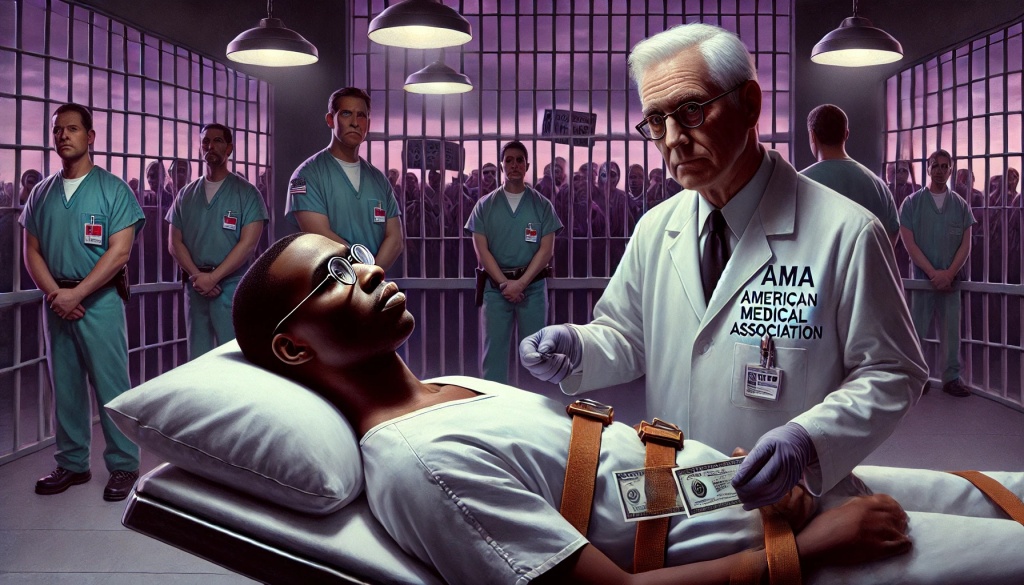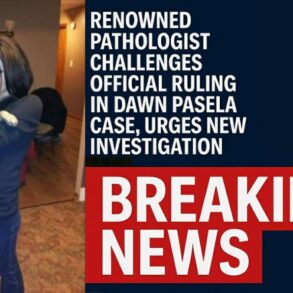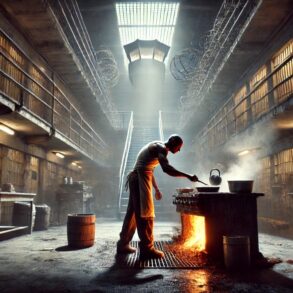by Justyna Madenska
Dying on some court schedule or some prison schedule ain’t right. People are supposed to die on God’s schedule.
Bryan Stevenson, Just Mercy: A Story of Justice and Redemption
It was 6:10 PM on Tuesday, September 24th, 2024. You’re probably wondering why that time stands out. It was the exact moment Marcellus Williams was pronounced dead. Nine minutes. That’s all it took. But for me, Marcellus died much earlier—on death row, an innocent man wrongfully convicted. And to me, he’s more than a victim of the system—he’s, my hero !
Writing this now takes a lot out of me. I’ve spent years advocating and fighting against wrongful convictions, but moments like this make me question everything. What’s the point of my work? What am I really achieving? Part of me just wants to quit, throw in the towel, and get a stable corporate job at a law firm. A typical 9-5, free from the weight of broken justice, would be easier, right?
But then, I look at one particular photo of Marcellus. His glasses are slightly crooked, and behind them, his eyes—so clear, so innocent. It stops me in my tracks. His eyes speak louder than any court ruling ever could. They tell the story of a man who was failed by the system, a man who never lost hope even when all hope was stripped away from him.
And in that moment, the doubts fade. I can’t stop. I won’t stop. His picture fuels the fire inside me to keep fighting, to give voice to those who can no longer speak for themselves, to stand up for the vulnerable, the silenced, the forgotten. Marcellus Williams may be gone, but his story lives on in my work, in the work of so many others who refuse to accept a broken system. For him, and for countless others, we push forward. Because if we don’t, who will?
On September 24th, 2024, the state of Missouri, under the authority of Governor Mike Parson, executed Marcellus Williams—a man many believe to be wrongfully convicted. Despite 1.6 million signatures on a petition demanding the halt of his execution, despite widespread calls for a pause to examine the doubts surrounding his guilt, Governor Parson did nothing. He had the power to stop it. He had the power to save a man’s life or, at the very least, to pause the process and give Marcellus a fair chance. But he chose not to.
The public doesn’t want this execution to move forward. The victim’s family doesn’t want this execution to move forward and the St Louis county prosecuting attorney’s office doesn’t want this execution to move forward.
Jonathan Potts, one of Williams’s attorneys
Why?
How does Governor Parson feel today, the day after this irreversible act? Does he wake up with the heavy weight of regret pressing down on his conscience? Does he wonder how many “what-ifs” will plague him in the weeks and months to come? It’s hard to believe that this Wednesday, September 25th, will be just another day for Mike Parson. His internal voice must surely be questioning the decision he made—the decision to allow the execution of a aninnocent man. What happened on September 24th was not just a failure of the justice system; it was a failure of basic humanity. Governor Parson could have shown empathy, humility, and an understanding that human beings—and justice systems—are not infallible. He could have acknowledged that perhaps the system got it wrong and paused, even temporarily, to prevent an irreversible tragedy. Instead, he stood by and allowed it to happen, failing to live up to the weight of his office or to his own humanity.
Some say justice doesn’t always exist, at least not in the ways we expect. It doesn’t always come in the form of a signed court ruling, a not-guilty verdict, or a last-minute reprieve. Sometimes, justice takes years. Sometimes, it arrives too late—after a man has been executed, his life stolen by a system that failed him. But there’s something greater than legal justice at play here: karma. Karma doesn’t forget, and it doesn’t ignore the wrongs done, even when those wrongs are wrapped in the official seal of the state. Those who played a part in the wrongful conviction and execution of Marcellus Williams will face the consequences of their actions. Governor Parson may not be held accountable in the eyes of the law, but he will be in the eyes of the public, and perhaps even in his own heart.
I never met Marcellus Williams in person, but you don’t have to meet someone face-to-face for them to make an impact on you. And Marcellus—he made a humongous impact on me. On who I am, on what I do, and on how I view the fight for justice. Marcellus had a son—Marcellus Williams Jr. On that terrible day, his son witnessed his father’s execution, watching as someone he loved and knew to be innocent was put to death. I can’t even begin to imagine the pain, the helplessness, the rage that must have coursed through him. How do you survive something like that? Watching your father—someone you know didn’t commit the crime he was convicted of—be executed right in front of you? And then there’s the attorney. I think about them a lot. To be a lawyer fighting for a client you believe in, knowing they’re innocent, yet feeling the weight of failure bearing down on you—it’s unbearable. You fight to the last second, hoping, praying that someone will intervene. You push the case, make the calls, write the appeals, and then you wait. You wait as the clock ticks closer to the appointed time, waiting for that miracle—a stay of execution. That’s what happened on September 24th. The lawyers, Marcellus Jr., his family—they were all holding their breath, hoping that at any moment, the phone would ring, and the execution would be called off. That someone, somewhere, would intervene and put an end to this tragedy before it was too late. But then, 6:01 PM came. There was no phone call. The seconds passed in deafening silence. And they proceeded. They took an innocent man, strapped him down, and ended his life. I can’t shake the feeling of hopelessness that must have settled in at that moment—the overwhelming grief and anger that they all felt as the reality of it sank in. There was no last-minute save. No justice.
Marcellus Williams Jr. watched as the system failed his father. As we all did. It’s moments like this that make you question everything—make you wonder if there’s any justice left in the world. But that’s where Marcellus Williams made his impact on me. His story, his fight, and his innocence remind me why we can’t stop. Why we must keep pushing, no matter how many times the system fails.
The more I think about Marcellus Williams’ case, the clearer it becomes this wasn’t an execution by the state; it was a murder. Not just any murder—a cold, calculated killing of an innocent man, a father, a human being. They didn’t just put him to death-on-death row. No, they murdered him. And the more I dwell on that, the harder it is to shake. I’ve seen the comments. From activists, lawyers, people who followed the case closely. There isn’t a single voice out there supporting this execution—this murder. Even the family of the victim, the very people who had every reason to want justice, opposed the execution. What does that tell you? If the family of the victim opposed it, how could the system possibly justify it? It tells me the system is broken. Shattered, really. The death penalty, as it stands, doesn’t offer justice—it offers a gray, terrifying space where anyone could find themselves, where one wrong step, one piece of bad luck, could lead to a nightmare with no waking up.
Think about it. If there’s a death penalty in the state you live in, and for some reason, your DNA, your hair, or any tiny trace of your presence is mistakenly tied to a crime scene, you could find yourself in that same chair, strapped down, waiting to die. It doesn’t matter if you’re innocent. The machinery of the system doesn’t care about innocence. It cares about closing cases and handing out sentences.
And then, he was gone. But he wasn’t just a name on a docket or a case number. He was a person—a man who loved, a father who dreamed of better days. The system didn’t care about that. All it saw was another person pushing through the broken gears of justice. Anyone could end up like him. If you live in a state with the death penalty, you’re one bad day, one misstep, or one faulty piece of evidence away from facing the same fate. That’s what makes this so horrifying. It’s not just about Marcellus; it’s about the fact that the system can do this to anyone. And the worst part? The system doesn’t seem interested in fixing itself. Even when it fails so spectacularly that the family of the victim stands against an execution, the machinery keeps moving, indifferent to the lives it grinds into dust.
In 2016, post-conviction DNA testing conducted on the handle of the knife used to murder Ms. Gayle that was found lodged in her neck detected the presence of male DNA and definitively excluded Mr. Williams as the source. That evidence has been reviewed and analyzed by three renowned DNA experts, all of whom concluded that Mr. Williams is not the source of the DNA on the knife handle.
Midwest Innocence Project.
The AMA has long condemned physician involvement in executions, arguing that it violates the foundational principle of medical ethics: “First, do no harm.” In a 2006 statement, the AMA clarified that physicians are bound by their oath to protect life, and participating in executions fundamentally undermines public confidence in the medical profession. The AMA’s Code of Medical Ethics explicitly prohibits physicians from engaging in tasks related to executions, including selecting injection sites, starting IV lines, prescribing or administering lethal drugs, and monitoring vital signs. The use of a physician’s skills for state-sanctioned killing, the AMA argues, is a betrayal of the medical profession’s mission to heal.
Oklahoma is paying a doctor $15,000 per execution, plus $1,000 for each day of training, to oversee the process of putting state prisoners to death. This startling revelation, disclosed during federal court hearings in January 2022, shines a harsh light on the state’s execution practices, raising ethical questions about the role of medical professionals in the death penalty.“The unnamed doctor stands to receive $130,000 for participating in a spree of executions scheduled between October 28, 2021, and March 10, 2022. Over that 19-week period, Oklahoma planned to execute seven prisoners, including Donald Grant, who was executed on January 27, 2022, and Gilbert Postelle, whose execution was set for February 17, 2022.”
Imagine in 2024, where a physician—someone trained to save lives and uphold medical ethics—willingly takes part in an execution. Not just in Missouri , but in another state equally controversial for its use of the death penalty. The person behind the syringe, the one who double-checks the lethal drugs and monitors the prisoner’s vital signs, is supposed to be bound by the Hippocratic oath, which states clearly: “First, do no harm.” How, then, does such a person reconcile the conflict of taking a life under the guise of medical supervision? The stark reality is that executions are not just about justice or punishment—they’re also a lucrative business. And the doctors who participate in these state-sanctioned killings are often compensated handsomely for their involvement. But at what cost to their conscience? At what cost to the integrity of the medical profession? physician—likely paid tens of thousands of dollars—stood by, checking the drugs, verifying his consciousness, and eventually declaring him dead. It’s unimaginable to consider how that physician felt when it was all over. Did they feel accomplished, as if they had done their job well? Or was there an overwhelming sense of regret? More importantly, how does one justify making a profit from a process that directly contradicts the very foundation of their profession? These doctors are paid blood money—literally. The funds they receive for participating in executions are tainted with the lives lost, yet they cash those checks and watch the numbers in their bank accounts grow. How does that affect their sense of morality? Do they save the money? Do they donate it, perhaps in a bid to ease their conscience? Or do they treat it like any other paycheck, a transaction for services rendered, no matter how grim those services might be? The irony is hard to miss. Physicians are required to pass rigorous exams and meet high ethical standards in order to practice medicine.These standards are designed to ensure that doctors are not only skilled but also dedicated to healing people. Yet here, they are part of an inhumane and irreversible process—ending a life. By taking part in executions, they are betraying the core values of their profession, reducing themselves to mere functionaries in a system that profits from death. If physicians refused to participate in executions, perhaps there would be fewer executions altogether. The involvement of medically trained personnel lends legitimacy to the death penalty, giving the process an air of clinical precision. Without them, the state’s ability to carry out executions could be severely hampered. But here’s the harsh truth: greed often triumphs over morality. In a world where money can be a powerful motivator, there will always be someone willing to say yes. Physicians who agree to participate in executions do so because they are paid to ignore the ethical implications. They’re not immune to the same financial pressures and desires as anyone else. But should the promise of financial gain outweigh the sanctity of life? For some, it clearly does. Imagine the physician who participated in Marcus Williams’ execution logging into their bank account and seeing a large deposit from the state for their role in ending his life. What must that feel like? Is it just another paycheck, or does the knowledge of what it represents weigh heavily on them? Do they compartmentalize it—convincing themselves that they were merely “doing their job,” even if that job led to someone’s death.
It’s crucial to acknowledge that the medical professionals involved in executions are often a critical part of making the process seem “humane.” Their presence is supposed to ensure that the execution is carried out without unnecessary suffering. But the reality is that no execution can truly be humane. Death by lethal injection is often portrayed as a clinical, painless procedure, but in many cases, it’s anything but. The execution of John Grant in 2021, where witnesses reported him vomiting and convulsing for fifteen minutes before being declared unconscious, stands as a horrifying example. How can a physician, someone who swore to protect lives, stand by and watch such suffering unfold? The truth is that the death penalty, as it exists today, is a broken system. It’s not about justice; it’s about revenge. And the participation of medical professionals only perpetuates that system. If physicians and other medical personnel refused to be involved, it might force states to confront the inherent cruelty of capital punishment. Without the veneer of medical legitimacy, executions would be revealed for what they are: cold-blooded killings sanctioned by the state. Yet as long as there are people willing to put a price tag on their ethics, the system will continue. Executions will go on, and those who profit from them will continue to do so, even as the rest of society grapples with the moral consequences.
Marcus Williams’ execution, like so many others, is a tragic reminder of how the intersection of greed and state power can lead to the ultimate injustice. As long as there are doctors willing to trade their ethics for a paycheck, the machinery of the death penalty will keep moving. And the blood on that money won’t just stain the hands of the state—it will forever mark the conscience of those who choose to profit from human suffering. In the end, the real question is: How can we allow a system that turns the sanctity of life into a financial transaction to continue? Until we address this, the bank accounts of those involved in executions will keep growing, while the rest of us are left to reckon with the cost—both moral and human.
We may never have met, but Marcellus’ life—and his wrongful death—has changed me forever. And as long as his story continues to echo, we owe it to him and to everyone like him to keep fighting for a world where no one ever has to witness their father die for a crime they didn’t commit. This wasn’t justice. It was murder, pure and simple. And until the system is reformed, until we face the reality of how broken it is, Marcellus Williams won’t be the last innocent man to meet such a cruel, unjust fate. Justice for Marcellus Williams may not have arrived in time to save his life. But the fight for justice for others like him will continue, driven by the voices of advocates and activists who refuse to let such atrocities go unchallenged. Governor Parson may have failed to act, but the rest of us will not.
All praise be to Allah in every situation!
last statement by Marcellus Williams…
This post was originally published on this site be sure to check out more of their content.








